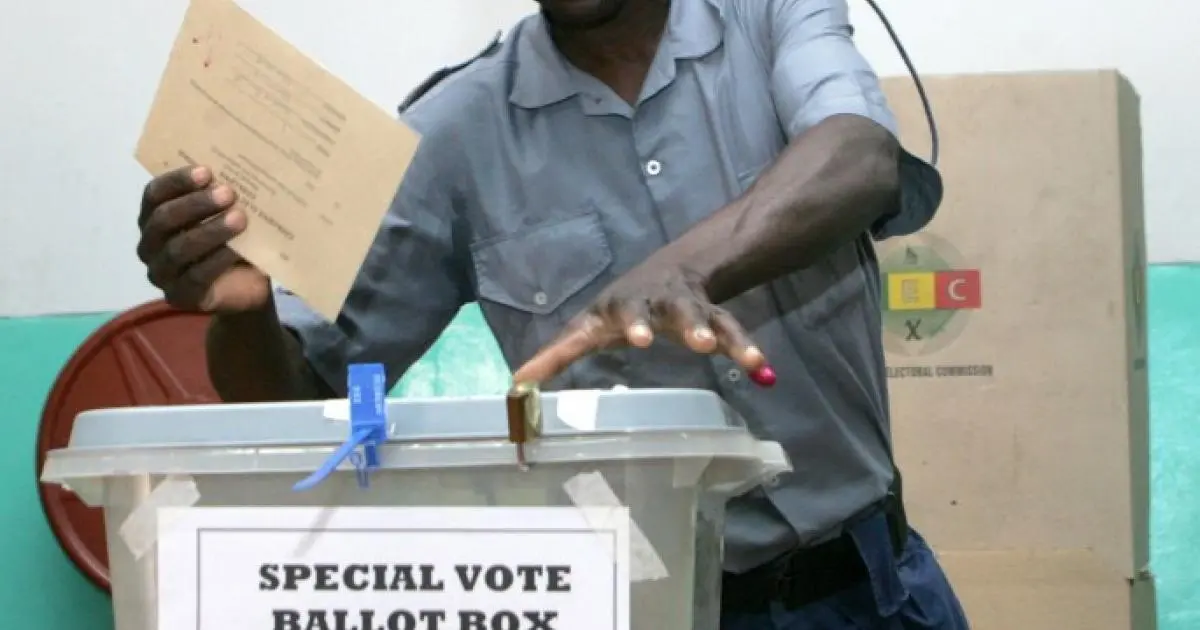There was chaos yesterday as it came to light that the Zimbabwe Electoral Commission (Zec) had “secretly” let law enforcement officers cast ballots before the election on August 23 without the presence of polling agents from political parties.
Yesterday, Zec deputy chairperson Rodney Simukai Kiwa confirmed the development, stating that only police personnel stationed outside of their districts were permitted to use the postal voting method, and that “there is no way postal voting can be monitored.”
“Yes they have been voting,” Kiwa said.
“We started sending out the postal ballots on Sunday and Monday.”
Citizens Coalition for Change spokesperson Fadzayi Mahere said political parties should have been allowed to deploy election agents to monitor the process.
“ALERT: We’ve received reports from all provinces that members of @PoliceZimbabwe are today casting their postal votes. Our agents and independent observers have not been allowed to monitor the process. Where is the transparency @ZECzim? #ZECMustExplain,” Mahere tweeted.
But Kiwa said postal voting was not subject to monitoring.
“There is no way postal votes can be monitored,” Kiwa said.
“Postal votes are not subject to monitoring. So the opposition or whoever who might want to monitor, it’s not possible. How can one tell whether there are postal votes? The law is very clear on that. How can you deploy observers on postal votes, because the postal ballots are dispatched in various places, so operationally, physically, it’s not possible.”
Zec recently published Statutory Instrument 140, which changed section 75(1)(d) of the Electoral Act to allow the chief elections officer to accept postal ballots no later than three days before to the election day rather than 14 days.
In the meantime, the Zimbabwe Republic Police (ZRP) has promoted 1500 police personnel across the whole nation in what is seen to be a move to improve their morale and purchase their allegiance before the August 23 elections.
However, according to Source , subordinate officers are unhappy about the controversial promotions amid allegations of nepotism and the politicisation of the selection process because the criteria were unclear.
In the past, police officers wrote examinations to be promoted.
Alternatively, for those who were not intellectually gifted, the force would invoke provisions of the Police Act to promote members of the force on account of good behaviour and hard work.
According to a memo written by Police Commissioner-General Godwin Matanga to all stations, and seen by source, all promoted officers will be transferred from their stations after the election.
“The Commissioner-General of Police is pleased to announce the promotion of the following members with effect from 11/08/23 as shown in order of merit,” Matanga said.
“Conferment of badges of rank shall be conducted by respective officers commanding provinces (for all provinces/CID/SU) and CSO admin in respect of PGHQ [Police General Headquarters] on Friday August 18, 2023 at 1000 hours.
“All promoted members shall not put on the new badges of rank until after conferment. Staff officer ordnance shall start issuing out new badges of rank on Wednesday August 16.
“Promoted members are to remain in their current stations until after the 2023 harmonised elections.”
Police spokesperson Assistant Commissioner Paul Nyathi confirmed the promotions.
He said: “It is not correct that the promotions are targeted at boosting the morale of police officers due to the pending general elections set for August 23, 2023. The Zimbabwe Republic Police has a promotional policy which guides the organisation on promotions as vacancies arise within the system due to natural manpower wastage such as retirement, death, resignation and those dismissed for various disciplinary reasons and criminal acts.”
He said Matanga had not received complaints from officers-in-charge about “the interference by some senior officers in order to promote their relatives or those close to the said senior officers”.
“In fact, the promotion exercise was conducted through boards of officers at station, district, provincial and national levels. These boards then submitted their recommendations to the Commissioner-General of Police,” Nyathi said.
“This was an open system which started at the station level based on merit. Above all, it is not possible for the ZRP to promote all police officers at one go. The Commissioner-General of Police is even happy to receive names of the said police officers who were promoted at the instigation or interference of some senior officers.”
Source, however, reports that there is disgruntlement over the criteria used to select officers deserving of promotion amid claims of nepotism.
“The criteria used to come up with the promotions were not clear,” once police source confided in Source yesterday.
“There are complaints of nepotism, where some officers known to be related to high-ranking officials were promoted. Police officers used to write examinations for them to be promoted, so promotion was on merit.
“But now the officer-in-charge recommends the officer for promotion which has now been marred with various irregularities. This has caused serious divisions within the force as many junior cops are against this process.”
Source ZiMetro










